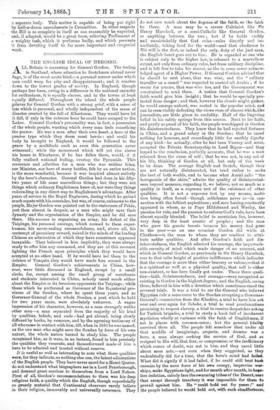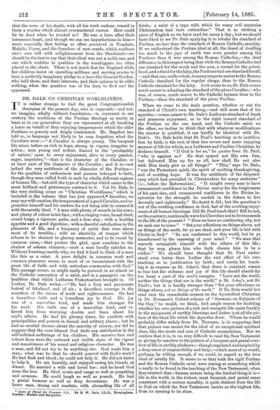THE ENGLISH IDEAL OF HEROISM. THE ENGLISH IDEAL OF HEROISM.
ALL Britain is sorrowing for General Gordon. The feeling in Scotland, where attention to Scotchmen abroad never flags, is of the most acute kind,—a personal sorrow under which men could weep for pity and disappointment; and it reaches down to the lowest grades of society. In England, though perhaps less keen, owing to a difference in the national capacity for enthusiasm, it is equally sincere, and in the towns at least equally diffused. Throughout the island the whole people grieves for General Gordon with a strong grief, with a sense of loss which is personal, and wholly independent of the sense of disaster created by the fall of Khartoum. They would have let it fall, if only in the extreme hour he could have escaped to the Lakes. General Gordon's personality was, in fact, a possession of the whole people, wanting which every man feels something the poorer. He was a man after their own heart, a hero of the precise type which they deem most heroic ; and could his body be brought to England, it would be followed to the grave by a multitude such as even this generation never witnessed ; while the monument which will yet rise above his bones in Khartoum, if he has fallen there, would, if it fully realised national feeling, overtop the Pyramids. This reverence and affection for a man who was neither King, nor Minister, nor hero of many battles, felt by an entire nation, is the more wonderful, because it was inspired almost entirely by the hero's character. General Gordon had done in his fiftytwo years of life some marvellous things ; but they were not things which ordinary Englishmen knew of, nor were they things redounding in any direct way to Englishmen's advantage. After years of service in the Royal Engineers, daring which he gained much repute with his comrades, but was, of course, unknown to the people, Major Gordon was pointed out to the statesmen of Pekin, inst then almost in despair, as a man who might save their dynasty and the organisation of the Empire, and he did save them. His success in organising an army, his defeat of the Taipings, his personal courage, which seemed to them superhuman, his never-ending resourcefulness, and, above all, his contempt of pecuniary reward, raised in the minds of the leading Chinese an admiration of which they have sometimes appeared incapable. They believed in him implicitly, they were always ready to offer him any command, and they are at this moment fighting the French upon principles which they would have accepted at no other hand. If he would have led them to the defence of Tonquin they would have made him second in the Empire. General Gordon's achievements in China, however, were little discussed in England, except by a small circle, for, except among the small group of merchants and students interested in China, nobody cared much either about the Empire or its ferocious opponents the Taipings ; while those which he performed as Governor of the Equatorial provinces of the Soudan, where he spent three years, and as Governor-General of the whole Soudan, a post which he held for two years more, were absolutely unknown. A vague impression of his character, however, as a man strangely unlike other men—a man separated from the majority of his kind by qualities, beliefs, and ends—had got abroad, being slowly diffused by books, by rumours, and by the agreeing testimony of all who came in contact with him, till, when in 1883 he was named, as the one man who might save the Soudan by force of his own nature, the whole nation turned to study him. The people recognised him, as it were, in an instant, found in him precisely the qualities they venerate, and thenceforward made of him a hero to be admired and trusted without reserve.
It is useful as well as interesting to note what those qualities were, for they indicate, as nothing else can, the latent admiration of the English people. They have never cared for a Henri Quatre, do not understand what biographers see in a Lord Peterborough, and demand great services to themselves from a Lord Nelson. First of all, Gordon's recommendations to them was his deep religious faith, a qnality which the English, though superfieially so grossly material that Continental observers rarely believe in their religion, immovably and universally reverence. They do not care much about the dogmas of the faith, so the faith be there. A man may be a severe Calvinist like Sir Henry Havelock, or a semi-Catholic like General Gordon, or anything between the two ; but if be holds visibly and unmistakably that God rules—rules directly and immediately, taking heed for the world—and that obedience to His will is the first, or indeed the only, duty of the just man, the English heart goes out to him. He is regarded as one who is subject only to the higher law, is released to a marvellous extent, not only from ordinary rules, but from military discipline, and is left free to take his course, as the in some sense acknowledged agent of a Higher Power. If General Gordon advised that he should be sent alone, that was wise, and the " solitary traveller on a camel " was expected to control all Arabia ; if he wrote for armies, that was wise too, and the Government was constrained to send them. A notion that General Gordon's faith would give him insight ; that ho would be specially protected from danger ; and that, however the clouds might gather, be would emerge unhurt, was rooted in the popular mind, and can be seen visibly deflecting the views even of classes which, like journalists, are little given to credulity. Half of the lingering belief in his safety springs from this source. Next to his faith, and partly as proof of his faith, the people worshipped in Gordon his disinterestedness. They knew that he had rejected fortunes in China, and a grand salary in the Soudan ; that he cared nothing for honours, and exceedingly little for earthly dignity of any kind—he actually, after he had been Viceroy and more, accepted the Private Secretaryship to Lord Ripon—and they leaped to the conclusion, perfectly accurate, that he was a man released from the curse of self ; that he was not, in any act of his life, thinking of Gordon at all, but only of the work to be done. The average English and Scotch, though they are not naturally disinterested, hut tend rather to make the best of both worlds, and to become what Amiel calls " the bourgeoisie of the skies," admire the quality of disinterestedness beyond measure, regarding it, we believe, not so much as a quality in itself, as a supreme test of the existence of other qualities. It is not a supreme test by any means, ambition being often found—though selfishness never is—in connection with the loftiest aspirations ; and men having constantly appeared in whom, as in Pope Hildebrand and Wesley, the passion for rule, and the passion to enforce God's rule, have been almost equally blended. The belief in asceticism lies, however, very deep in the least ascetic of peoples ; and the man who gave his guests brewis because his money had gone to the poor —as on one occasion Gordon did while at Chatham—is the man to whom they are readiest to attribute nobler qualities. And after Gordon's faith and disinterestedness, the English admired his courage, the imperturbable serenity of mind which made danger of no account, and which in General Gordon, as previously in Sir Henry Havelock, rose to that calm height of positive indifference which indicates that the courage is more than either bravery or valour,—that it is a spiritual as well as a physical quality, that self is either non-existent, or has been finally got under. Those three qualities—faith, disinterestedness, and courage—were recognised as existing in Gordon in the highest degree ; and the English, seeing them, believed in him with a devotion which sometimes stood the severest trials. It was a trial to see the General who believed Egyptian rule a mere curse to the Soudan accepting a GovernorGeneral's commission from the Khedive, a trial to have him ask over and over again for Zebehr, a trial to read proclamations promising to respect slavery, a trial to receive despatches asking for Turkish brigades, a trial to study a book full of incoherent mysticism wholly at variance with the faith of Englishmen, if not in places with common-sense ; but the general fidelity survived them all. The people felt somehow that under all that muddle of imaginings, projects, and dreams was a hero, a man always seeking the service of God, and so resigned to His will, that fear, or compromise, or the inefficiency which comes of doubt, was not in him, and they cared little about mere acts,—not even when they suggested, as they undoubtedly did for a time, that the hero's mind had failed. What did it signify if it had failed, if he could still beat bask enemies by the mere force of his own energy, improvise warships, make Egyptians fight, and for month after month, inlopeless isolation, calmly face the swarming tribes of the Desert's:are that except through treachery it was impossible for them to prevail against him. He " could hold out for years ;" and the people believed he would hold out, with such steadfastness,
that the news of his death, with all his work undone, roused in them a wonder which almost overmastered sorrow. How could he be dead when he trusted so ? He was a hero after their innermost heart ; and though we can see imperfections in him— more especially that feeling so often perceived in Prophets, Mandis, Popes, and the founders of new creeds, which confuses one's own will with enlightenment from the Sheehinah—we should be the last to say that their ideal was not a noble one, and one which testifies to qualities in the worshippers too often placed in the shade. There is not much fear for England while her children insist on spending millions and moving armies to keep a perfectly imaginary pledge to a hero like General Gordon, who held them, and their interests, and their opinion to be alike nothing, when the question was of his duty to God and the oppressed.



































 Previous page
Previous page